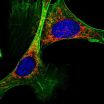(Press-News.org) HOUSTON – Fibrous tissue long suspected of making pancreatic cancer worse actually supports an immune attack that slows tumor progression but cannot overcome it, scientists at The University of Texas MD Anderson Cancer Center report in the journal Cancer Cell.
"This supportive tissue that's abundant in pancreatic cancer tumors is not a traitor as we thought but rather an ally that is fighting to the end. It's a losing battle with cancer cells, but progression is much faster without their constant resistance," said study senior author Raghu Kalluri, Ph.D., M.D., chair of Cancer Biology. "It's like having a car with weak yet functioning brakes vs. having one with no brakes."
The team's findings point to a potential new avenue for guiding treatment, including immunotherapy, and offer an explanation for the failure of a promising combination drug approach in clinical trials.
"Cancer is one form of tissue injury. When our defense system detects damaged cells it sends soldiers to contain and repair the damage," Kalluri said. "When it cannot remove the damaged cells and repair the injured area, our defensive fibrotic response tries to put a boundary around it, to contain it and prevent it from spreading."
Pancreatic cancer is resistant to treatment and only about 7 percent of patients survive for five years. An estimated 46,420 new U.S. cases will be diagnosed in 2014 and 39,590 people will die of the disease.
Study results consistent with failed clinical trial
Kalluri and colleagues used genetically engineered mouse models that allowed depletion of tissue-repair cells called myofibroblasts in pancreatic cancer. Myofibroblasts compose a major portion of supportive tissue called stroma and also produce collagen, which serves as a scaffold for wound-healing and tissue regeneration. Up to 90 percent of a pancreatic tumor can consist of fibrotic support tissue.
When the scientists depleted myofibroblast production in mice with either early or later-stage pancreatic ductal adenocarcinoma their tumors became much more invasive, aggressive and lethal.
"We did these experiments thinking that we would show the importance of myofibroblasts and fibrosis in pancreas cancer progression, but the results went completely against that hypothesis," Kalluri said.
Since myofibroblasts and collagen are thought to block chemotherapy, the team treated their myofibroblast-depleted mice with gemcitabine, the standard treatment for pancreas cancer. The drug did not have any effect on the disease course or improve survival.
These results track those of a major clinical trial that combined a myofibroblast-depleting drug called a hedgehog inhibitor with gemcitabine to treat pancreatic cancer patients. The trial was stopped in 2012 when an interim analysis showed the patients taking the combination had faster disease progression than the control group that took only gemcitabine, a surprising result.
"This paradigm-shifting study identifies the reason why the hedgehog-inhibitor trials failed," said co-author Anirban Maitra, M.D., professor of Pathology and scientific director of the Sheikh Ahmed Bin Zayed Al Nahyan Center for Pancreatic Cancer Research.
All solid tumors include some degree of fibrosis, Maitra said, but not as much as pancreas cancer.
The team’s analysis of pancreatic tumors from 53 patients showed low levels of tumor myofibroblasts are associated with decreased survival.
Study findings are consistent with pathologic evidence that tumors with more fibrotic tissue more closely resemble normal pancreas tissue, indicating a better prognosis for patients, even though lab experiments indicated those tumors should be more aggressive, Maitra said.
"These findings also are likely to account for rather modest results in a phase I clinical trial of immunotherapy alone for pancreatic cancer," Maitra said. "But it's not just a negative study, because it suggests what might work for these patients."
And what might work hinges on immune checkpoint blockade.
The immune system connection
To understand the cause of the swift progression, the team conducted gene expression profiling and RNA sequence analysis comparing control tumors to myofibroblast-depleted tumors.
Genes associated with tumor immunity were suppressed and fewer T cells and B cells infiltrated the myofibroblast-depleted tumors. The proportion of regulatory T cells, which suppress immune response, increased. They found greater expression of the immune checkpoint CTLA-4, which shuts down immune response.
The researchers then set up a new experiment using ipilimumab, a drug developed by co-author Jim Allison, Ph.D., chair of Immunology, that blocks CTLA-4, freeing T cells to attack tumors.
Mice with depleted myofibroblasts who were treated with ipilimumab to stifle CTLA-4 had an average survival increase of 60% compared to untreated control mice and those with either depleted myofibroblasts or treated with ipilimumab alone.
These findings suggest that ipilimumab might work for patients with low levels of fibrosis in their tumors, Kalluri noted. Combining ipilimumab with a hedgehog inhibitor is likely to work better for those with high-fibrosis. The Kalluri laboratory is exploring these issues.
INFORMATION:
Co-authors with Kalluri, Maitra and Allison are first author Berna Özdemir, M.D., Ph.D., Julienne Carstens, Ph.D., Xiaofeng Zheng, Ph.D., Hikaru Sugimoto, Ph.D., Christoph Kahlert, Ph.D., and Valerie LeBleu, Ph.D. of Cancer Biology; Tsvetelina Pentcheva-Hoang, Ph.D., Tyler Simpson, Ph.D., and Padmanee Sharma, M.D., Ph.D., of Immunology; Chia-Chin Wu, Ph.D., and Lynda Chin, M.D., of Genomic Medicine; Hanane Laklai, Ph.D., and Valerie Weaver, Ph.D., of University of California, San Francisco; Sergey Novitskiy, M.D., Ph.D., and Harold Moses, M.D., of Vanderbilt University School of Medicine, Nashville, Tenn.; Ana De jesus-Acosta, M.D., Johns Hopkins Hospital, Baltimore; and Pedram Heidari, M.D., and Umar Mahmood, M.D., Ph.D., of Massachusetts General Hospital, Boston.
Ozdemir, Sigumoto, LeBleu, and Kahlert also were affiliated with Beth Deaconess Medical Center and Harvard Medical School during this research.
Kalluri holds the Rebecca Meyer Brown and Joseph Mellinger Brown Chair in Basic Science at MD Anderson. Maitra holds the Sheikh Khalifa Bin Zayed Al Nahyan Distinguished University Chair and Allison the Vivian L. Smith Distinguished Chair in Immunology.
This research was funded by grants from the National Cancer Institute of the National Institutes of Health (UO1 CA151925, CA113669, CA125550, CA155370 and CA163191, DK55001), the Cancer Prevention and Research Institute of Texas; MD Anderson's Metastasis Research Center; the OncoSuisse M.D./Ph.D. Scholarship, the Swiss National Science Foundation Fellowship and a research fellowship from Deutsche Forschungsgemeinschaft.
About MD Anderson
The University of Texas MD Anderson Cancer Center in Houston ranks as one of the world's most respected centers focused on cancer patient care, research, education and prevention. MD Anderson is one of only 41 comprehensive cancer centers designated by the National Cancer Institute (NCI). For ten of the past 12 years, including 2013, MD Anderson has ranked No. 1 in cancer care in "Best Hospitals," a survey published annually in U.S. News & World Report. MD Anderson receives a cancer center support grant from the NCI of the National Institutes of Health (P30 CA016672).
Get MD Anderson News Via RSS Follow MDAnderson News on Twitter
Supportive tissue in tumors hinders, rather than helps, pancreatic cancer
Study shows fibrosis summons an immune attack, challenges theory that it blocks chemotherapy
2014-05-22
ELSE PRESS RELEASES FROM THIS DATE:
Blocking pain receptors extends lifespan, boosts metabolism in mice
2014-05-22
Blocking a pain receptor in mice not only extends their lifespan, it also gives them a more youthful metabolism, including an improved insulin response that allows them to deal better with high blood sugar.
"We think that blocking this pain receptor and pathway could be very, very useful not only for relieving pain, but for improving lifespan and metabolic health, and in particular for treating diabetes and obesity in humans," said Andrew Dillin, a professor of molecular and cell biology at the University of California, Berkeley, and senior author of a new paper describing ...
One molecule to block both pain and itch
2014-05-22
Duke University researchers have found an antibody that simultaneously blocks the sensations of pain and itching in studies with mice.
The new antibody works by targeting the voltage-sensitive sodium channels in the cell membrane of neurons. The results appear online on May 22 in Cell.
Voltage-sensitive sodium channels control the flow of sodium ions through the neuron's membrane. These channels open and close by responding to the electric current or action potential of the cells. One particular type of sodium channel, called the Nav1.7 subtype, is responsible for ...
Deciphered the process through which cells optimize metabolism to burn sugars or fats
2014-05-22
To guarantee efficient use of nutrients, cells have systems that permit them to capture and transport the available nutrient molecules to their interior. But if several nutrients are available, cells can select those that are of most interest and discard undesired molecules.
Inside cells, nutrients are conducted to the mitochondria, the specialized cell organelles in which nutrients are combusted to release the energy held in their chemical bonds. Both sugars (glucose) and fats (fatty acids) are 'burned' in mitochondria, but these organelles need to adjust their molecular ...
New insight into stem cell development
2014-05-22
The world has great expectations that stem cell research one day will revolutionize medicine. But in order to exploit the potential of stem cells, we need to understand how their development is regulated. Now researchers from University of Southern Denmark offer new insight.
Stem cells are cells that are able to develop into different specialized cell types with specific functions in the body. In adult humans these cells play an important role in tissue regeneration. The potential to act as repair cells can be exploited for disease control of e.g. Parkinson's or diabetes, ...
Study: Some pancreatic cancer treatments may be going after the wrong targets
2014-05-22
ANN ARBOR, Mich. — New research represents a significant change in the understanding of how pancreatic cancer grows – and how it might be defeated.
Unlike other types of cancer, pancreatic cancer produces a lot of scar tissue and inflammation. For years, researchers believed that this scar tissue, called desmoplasia, helped the tumor grow, and they've designed treatments to attack this.
But new research led by Andrew D. Rhim, M.D., from the University of Michigan Comprehensive Cancer Center, finds that when you eliminate desmoplasia, tumors grow even more quickly and ...
'I can' mentality goes long way after childbirth
2014-05-22
The way a woman feels about tackling everyday physical activities, including exercise, may be a predictor of how much weight she'll retain years after childbirth says a Michigan State University professor.
James Pivarnik, a professor of kinesiology and epidemiology at MSU, co-led a study that followed 56 women during pregnancy and measured their physical activity levels, along with barriers to exercise and the ability to overcome them.
Six years later, the research team followed up with more than half of the participants and found that the women who considered themselves ...
What is being said in the media and academic literature about neurostimulation?
2014-05-22
Over the past several decades, neurostimulation techniques such as transcranial direct current stimulation (tDCS) have gradually gained favour in the public eye. In a new report, published yesterday in the prestigious scientific journal Neuron, IRCM ethics experts raise important questions about the rising tide of tDCS coverage in the media, while regulatory action is lacking and ethical issues need to be addressed.
TDCS is a non-invasive form of neurostimulation, in which constant, low current is delivered directly to areas of the brain using small electrodes. Originally ...
EuroPCR 2014 examines whether science translates into practice with new session format
2014-05-22
22 May 2014, Paris, France: The value of analysing published clinical trials and the benefit of informed discussion were highlighted yesterday when the ACCOAST trial data were discussed in a new session format—Will this trial change my practice?— at EuroPCR 2014. ACCOAST trial results demonstrate that pre-treatment with prasugrel in NSTEMI patients undergoing percutaneous coronary intervention (PCI) is inferior to treatment with the drug after angiography. Several other trials are also being scrutinised in the same format, which ends with a discussion with the audience ...
New details on microtubules and how the anti-cancer drug Taxol works
2014-05-22
A pathway to the design of even more effective versions of the powerful anti-cancer drug Taxol has been opened with the most detailed look ever at the assembly and disassembly of microtubules, tiny fibers of tubulin protein that form the cytoskeletons of living cells and play a crucial role in mitosis. Through a combination of high-resolution cryo-electron microscopy (cryo-EM) and new methodology for image analysis and structure interpretation, researchers with the Lawrence Berkeley National Laboratory (Berkeley Lab) and the University of California (UC) Berkeley have produced ...
Which way is up?
2014-05-22
What do sled dogs and cell clusters have in common? According to research by UC Santa Barbara's Denise Montell, they both travel in groups and need a leader to make sure they all follow in the same direction.
Montell, Duggan Professor of Molecular Cellular and Developmental Biology, and colleagues worked on three independent projects involving E-cadherin, a protein found in epithelial cells throughout the body. The researchers used fruit-fly ovaries to uncover the role played by E-cadherin in collective cell migration. Their findings are reported today in the journal ...
LAST 30 PRESS RELEASES:
Study reveals insights about brain regions linked to OCD, informing potential treatments
Does ocean saltiness influence El Niño?
2026 Young Investigators: ONR celebrates new talent tackling warfighter challenges
Genetics help explain who gets the ‘telltale tingle’ from music, art and literature
Many Americans misunderstand medical aid in dying laws
Researchers publish landmark infectious disease study in ‘Science’
New NSF award supports innovative role-playing game approach to strengthening research security in academia
Kumar named to ACMA Emerging Leaders Program for 2026
AI language models could transform aquatic environmental risk assessment
New isotope tools reveal hidden pathways reshaping the global nitrogen cycle
Study reveals how antibiotic structure controls removal from water using biochar
Why chronic pain lasts longer in women: Immune cells offer clues
Toxic exposure creates epigenetic disease risk over 20 generations
More time spent on social media linked to steroid use intentions among boys and men
New study suggests a “kick it while it’s down” approach to cancer treatment could improve cure rates
Milken Institute, Ann Theodore Foundation launch new grant to support clinical trial for potential sarcoidosis treatment
New strategies boost effectiveness of CAR-NK therapy against cancer
Study: Adolescent cannabis use linked to doubling risk of psychotic and bipolar disorders
Invisible harms: drug-related deaths spike after hurricanes and tropical storms
Adolescent cannabis use and risk of psychotic, bipolar, depressive, and anxiety disorders
Anxiety, depression, and care barriers in adults with intellectual and developmental disabilities
Study: Anxiety, gloom often accompany intellectual deficits
Massage Therapy Foundation awards $300,000 research grant to the University of Denver
Gastrointestinal toxicity linked to targeted cancer therapies in the United States
Countdown to the Bial Award in Biomedicine 2025
Blood marker from dementia research could help track aging across the animal world
Birds change altitude to survive epic journeys across deserts and seas
Here's why you need a backup for the map on your phone
ACS Central Science | Researchers from Insilico Medicine and Lilly publish foundational vision for fully autonomous “Prompt-to-Drug” pharmaceutical R&D
Increasing the number of coronary interventions in patients with acute myocardial infarction does not appear to reduce death rates
[Press-News.org] Supportive tissue in tumors hinders, rather than helps, pancreatic cancerStudy shows fibrosis summons an immune attack, challenges theory that it blocks chemotherapy




